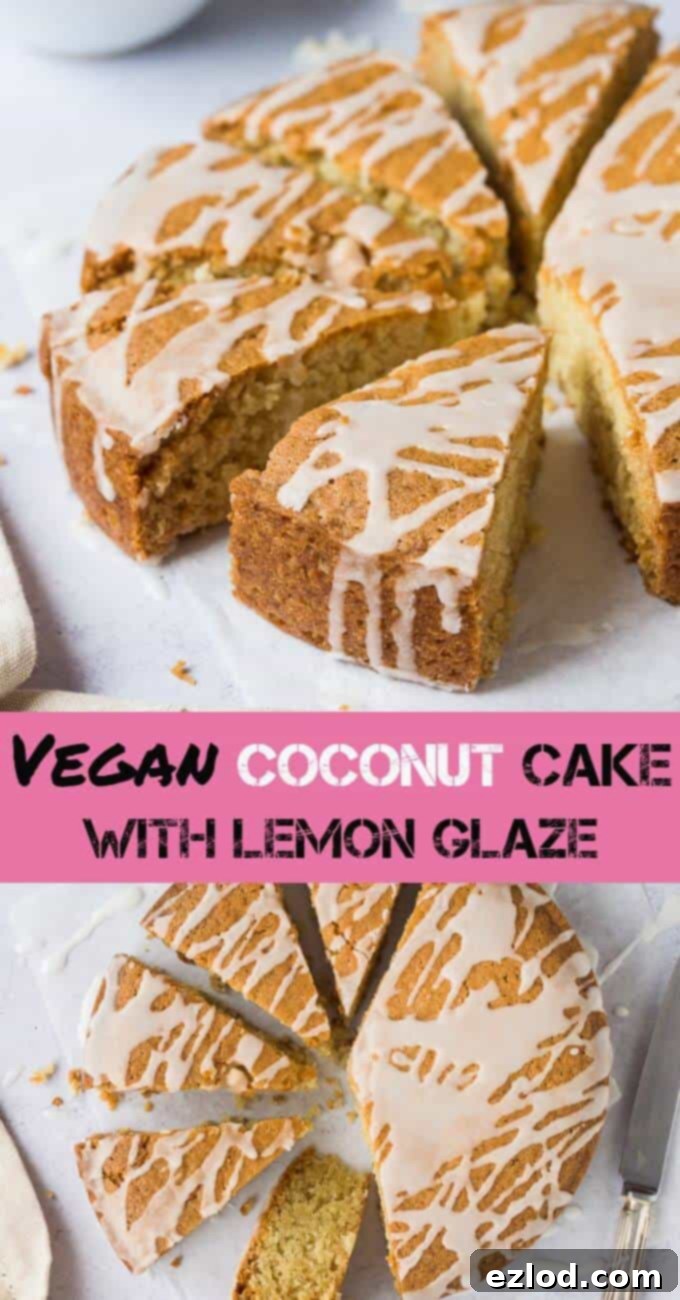The Ultimate Moist Vegan Coconut Cake with Zesty Lemon Glaze: An Easy Eggless Delight
Discover the secret to an incredibly moist and intensely coconutty vegan cake, finished with a bright and zesty lemon glaze. This eggless, dairy-free coconut cake recipe is surprisingly easy to make and perfect for any occasion, whether it’s a casual snack or a special dessert.

There are some recipes that just hit different, and this vegan coconut cake is absolutely one of them. My husband, not usually one for such grand declarations, has confidently crowned this “the best cake ever.” While I might hesitate to give any single cake that ultimate title, I must admit, it unquestionably ranks among my all-time favorites. Its incredible texture and rich flavor make it a truly outstanding plant-based dessert, proving that eggless and dairy-free baking can be just as, if not more, delightful than traditional recipes. If you’re searching for a moist vegan cake that genuinely satisfies, look no further.
This is a wonderfully moist, satisfyingly dense cake, boasting a deeply authentic coconut flavor that shines through every bite. The beauty of this recipe lies in its simplicity and the perfect balance of flavors. A straightforward lemon glaze is all that’s required to elevate it to perfection, adding a refreshing tang that beautifully complements the sweet coconut. For those who prefer a slightly different citrus note, a lime glaze would be an equally fantastic alternative. This vegan coconut cake is the quintessential treat to enjoy in generous wedges alongside a steaming cup of tea or coffee, offering a moment of pure bliss. But don’t let that limit you – it’s also absolutely divine served warm, perhaps with a scoop of your favorite vegan vanilla ice cream, turning a simple snack into an indulgent dessert.
The journey to perfecting this particular vegan coconut cake began with my popular raspberry, coconut and lemon layer cake recipe, which, in its original form, was not vegan. My initial ambition was to craft a vegan rendition of that exact layer cake. However, I encountered a common challenge in vegan baking: adapting a cooked flour frosting to be entirely plant-based. To prevent it from splitting, I found myself needing to use a substantial amount of vegetable shortening, which, unfortunately, compromised the delicate flavor I was aiming for. It’s a culinary puzzle I’ve set aside for another day, but the experience led me directly to this single-layer marvel – a moist vegan coconut cake that truly stands on its own.
For those who love the idea of a towering dessert, this versatile vegan coconut cake batter can indeed be transformed into a stunning layer cake. Instead of using one deep 20cm/8 inch tin, simply divide the batter equally among three 15cm/6 inch tins. Bear in mind that thinner layers cook much faster; they will likely be ready in a swift 15-20 minutes. It’s crucial to keep a very close eye on them to prevent overbaking, as even a minute or two too long can lead to a dry texture, which is the antithesis of this cake’s moist character. When baked correctly, these layers will create a beautiful foundation for your favorite vegan frosting – perhaps a simple vanilla buttercream or even a luscious cream cheese frosting to enhance the tropical flavor.
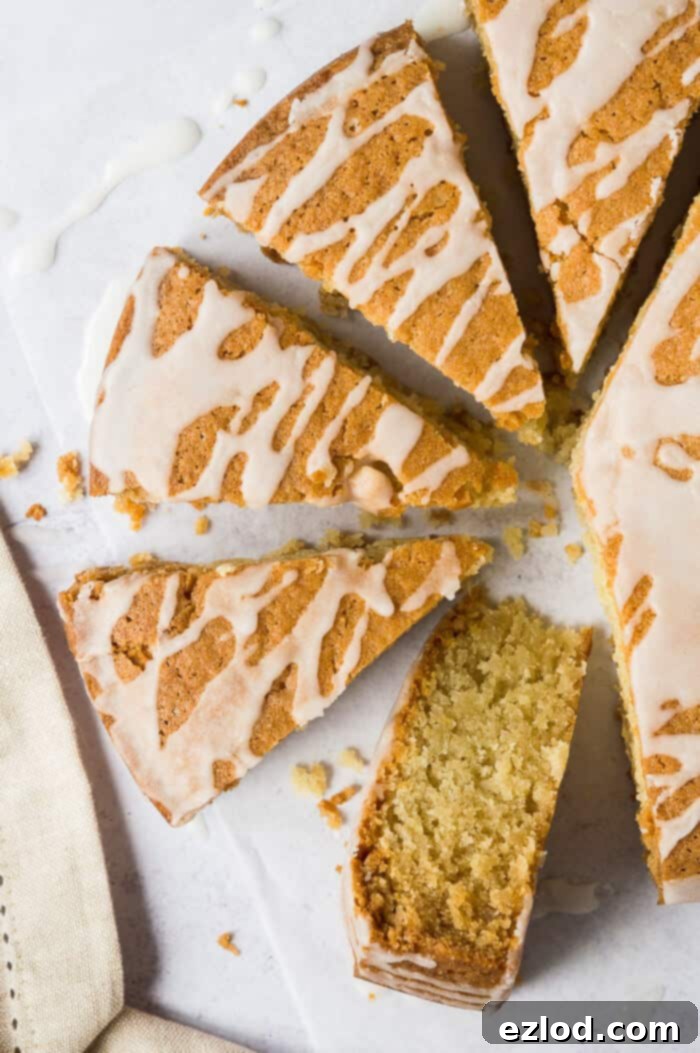
How To Make the Most Delicious Vegan Coconut Cake: Step-by-Step Guide
(For a complete list of ingredients and detailed, printable instructions, please refer to the recipe card conveniently located below.)
*Achieving the perfect bake relies heavily on precision. For the absolute best results with this moist vegan coconut cake, it is highly recommended to adhere closely to the recipe. As always, I strongly advocate for using gram measurements with a digital scale rather than cup conversions. Cup measurements, due to their inherent variability, are simply not accurate enough for baking, and I cannot guarantee optimal results if they are used.*
Preparing the Coconut Base: Begin by combining full-fat coconut milk and unsweetened desiccated coconut in a small saucepan. Bring this mixture gently to a boil over medium heat, stirring occasionally. Once it reaches a boil, immediately remove the pan from the heat and set it aside to cool completely to room temperature. This crucial step allows the desiccated coconut to soften beautifully, rehydrating it and ensuring it imparts a much finer texture and richer, more pronounced coconut flavor throughout the cake. This pre-soaking is key to achieving that wonderfully moist mouthfeel and intense coconutty goodness.
Mixing the Wet Ingredients: Once your coconut milk and desiccated coconut mixture has cooled, it’s time to incorporate the remaining wet ingredients. Into this cooled coconut base, whisk in the vanilla extract and, if you desire an even deeper coconut flavor, the optional but highly recommended coconut extract. Next, add the melted coconut oil, white wine vinegar, and glycerine. Glycerine, while optional, is a fantastic baker’s secret for maintaining exceptional moisture in cakes, especially in vegan recipes where eggs are absent. Finally, add the caster sugar and whisk everything together until all ingredients are thoroughly combined and the sugar has largely dissolved. This creates a rich, flavorful liquid base for your cake batter.
Combining Wet and Dry: In a separate, larger mixing bowl, sift together your dry ingredients: plain (all-purpose) flour, bicarbonate of soda (baking soda), baking powder, and salt. Sifting is important for aerating the flour and preventing lumps, leading to a smoother, more uniform cake crumb. Once the dry ingredients are perfectly combined, gently pour the wet coconut mixture into the bowl of dry ingredients. Using a whisk or a spatula, mix gently until just combined. It’s crucial not to overmix at this stage; overmixing can develop the gluten in the flour too much, resulting in a tough, dense cake. A few small lumps are perfectly fine and will bake out.
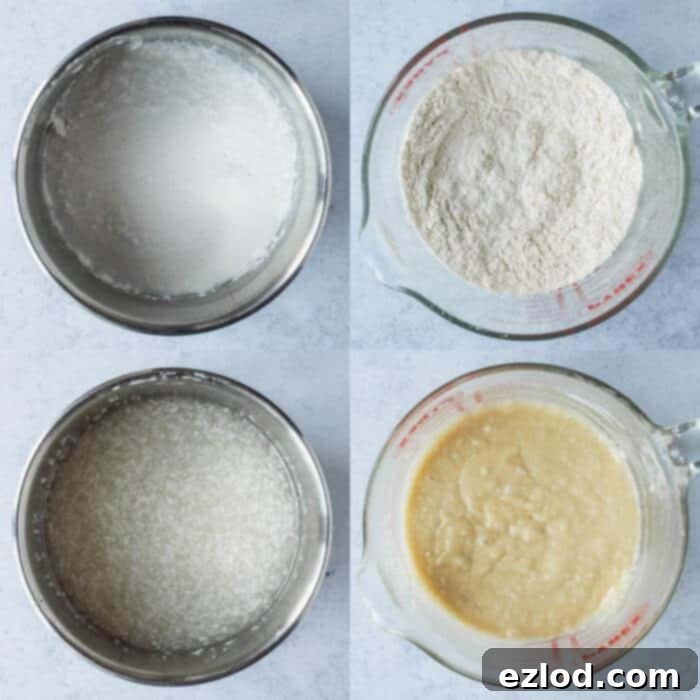
Baking Your Vegan Coconut Cake: Prepare a deep 20cm/8 inch round cake tin by greasing it thoroughly and lining the bottom with baking parchment. This ensures your beautiful cake releases easily after baking. Pour the prepared batter into the lined tin, spreading it out evenly with a spatula to create a level surface. Bake in your preheated oven for approximately 40-50 minutes. The cake is ready when it turns a beautiful golden brown on top, and a skewer inserted into the very center comes out clean or with just a few moist crumbs clinging to it. Exercise extreme caution not to overbake, as this is the most common culprit for a dry cake. A slightly underbaked cake is often preferable to an overbaked one, especially when aiming for that signature moist vegan texture.
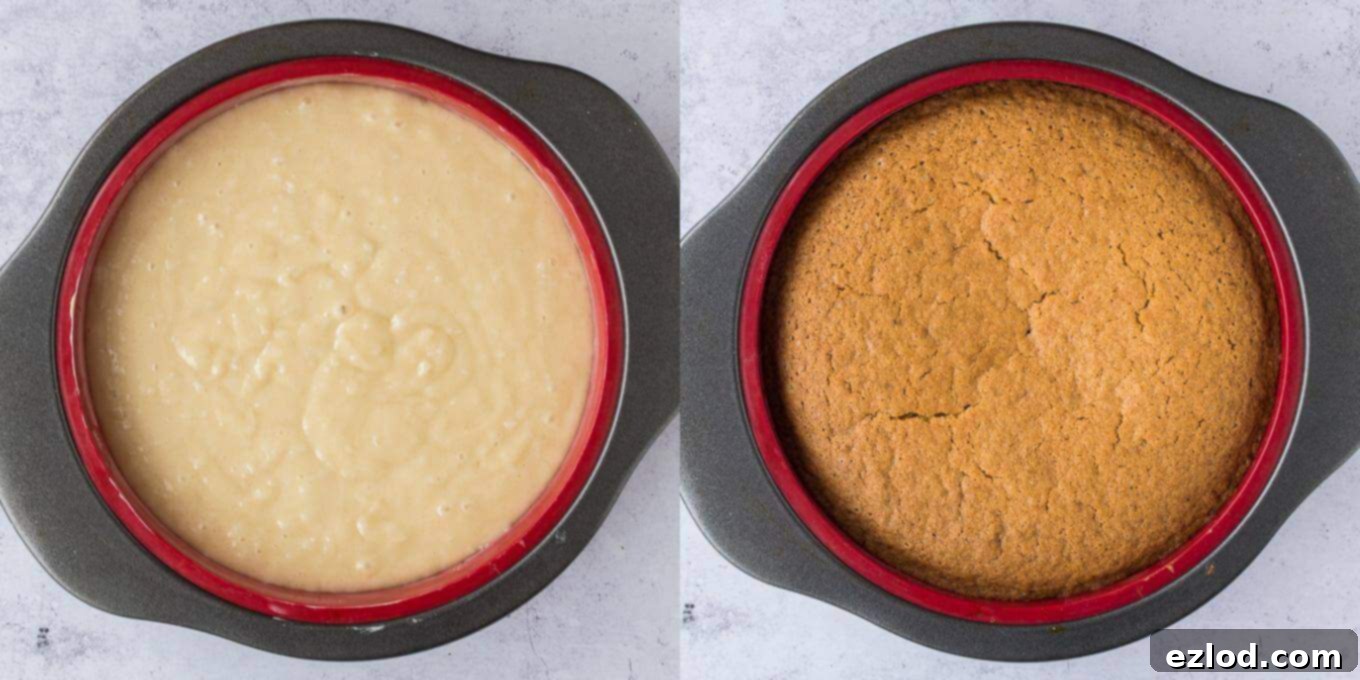
Cooling and Glazing: Once baked, allow the cake to cool completely in its tin on a wire rack. This slow cooling process is vital for the cake to set properly and retain its moisture. Only when fully cool should you carefully invert it onto a serving plate or stand. It is quite normal for this type of moist, dense cake to dip slightly in the middle as it cools; this is a natural characteristic and a sign of its wonderful texture, not a flaw. While the cake cools, prepare your simple yet vibrant lemon glaze. Once cooled, drizzle the glistening glaze generously over the top of the cake, allowing it to drip appealingly down the sides. The tartness of the lemon against the sweet, tropical coconut is simply divine.

How Long Will This Vegan Coconut Cake Keep Fresh?
One of the many advantages of this moist vegan coconut cake is its excellent keeping qualities. Stored in an airtight container at cool room temperature, it will remain wonderfully fresh and delicious for up to five days. Because this cake uses coconut oil as its primary fat, it may become a little firmer when stored in cooler environments. If you find your slice isn’t as soft as you’d like, a quick refresh in the microwave for about 20 seconds will restore its tender, moist texture perfectly. This makes it an ideal bake-ahead option for gatherings or for simply having a delightful treat on hand throughout the week.
Can I Freeze This Vegan Coconut Cake?
Absolutely! This vegan coconut cake freezes exceptionally well, making it perfect for meal prepping desserts or saving leftovers for a future craving. To freeze, ensure the cake is completely cooled (and glazed, if preferred, though some might opt to glaze after thawing). Wrap individual slices or the entire cake tightly in plastic wrap, then an additional layer of aluminum foil to prevent freezer burn. When you’re ready to enjoy it, simply allow it to defrost at room temperature. For an extra touch of warmth and softness, gently heat a slice in the microwave for a short burst before serving. This truly is a versatile eggless and dairy-free dessert!
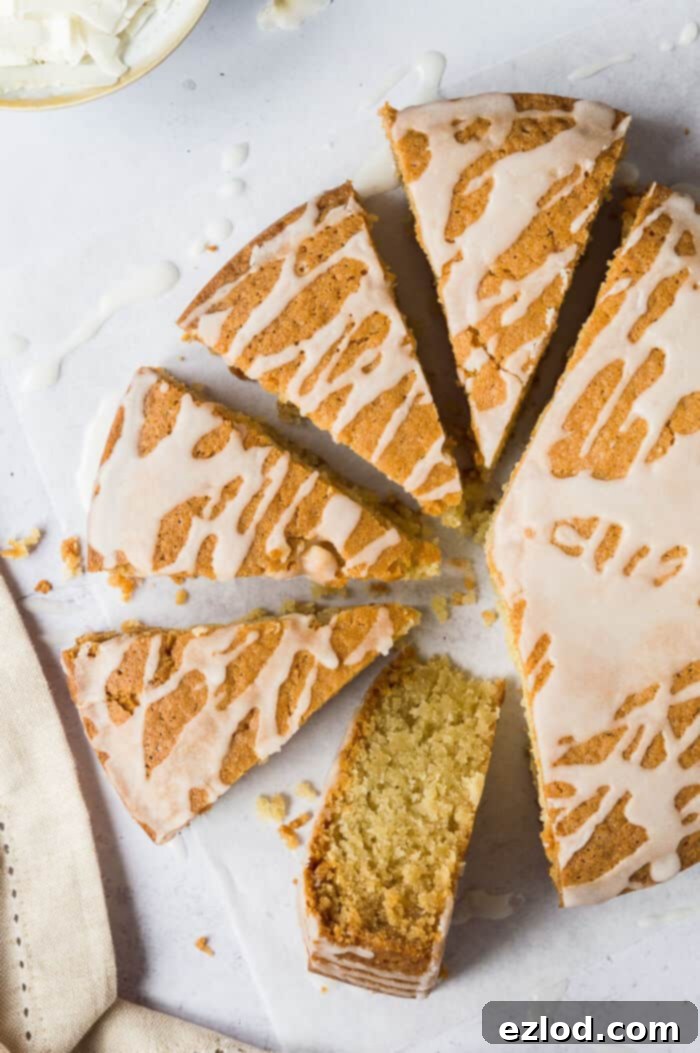
If you’re eager to try your hand at a magnificent layered creation, rather than a single-layer cake, I highly recommend giving my vegan coconut layer cake recipe a try! It’s designed specifically for those show-stopping moments.
Did you bake this wonderfully moist vegan coconut cake? We’d love to see your creations! Share your photos on Instagram and tag @domestic_gothess and use the hashtag #domesticgothess to join our baking community!

Print
Vegan Coconut Cake
Ingredients
For the Moist Vegan Coconut Cake:
- 250 ml (1 cup) full fat coconut milk
- 50 g (heaped ½ cup) unsweetened desiccated coconut
- 1 tsp vanilla extract
- 1 tsp coconut extract optional, for an intensified coconut flavor
- 150 g (scant ¾ cup) melted coconut oil
- 1 ½ tsp white wine vinegar
- 2 tsp glycerine optional, highly recommended for extra moisture
- 200 g (1 cup) caster sugar
- 260 g (2 cups + 3 Tbsp) plain (all-purpose) flour
- 1 tsp bicarbonate of soda (baking soda)
- 1 tsp baking powder
- ¼ tsp salt
For the Zesty Lemon Glaze:
- 85 g (⅔ cup) icing (powdered) sugar sifted, for a smooth glaze
- juice of ½ lemon adjust to desired consistency and tartness
Instructions
-
Preheat your oven to 180C/350F/gas mark 4. Prepare a deep 20 cm / 8 inch round cake tin by thoroughly greasing it and lining the bottom with baking parchment to prevent sticking.
-
In a small saucepan, combine the full-fat coconut milk and desiccated coconut. Bring this mixture to a gentle boil, then immediately remove it from the heat. Set it aside to cool down completely to room temperature; this step is crucial for softening the coconut and enhancing the cake’s flavor and texture.
-
Once the coconut mixture is cool, whisk in the vanilla extract, coconut extract (if using), melted coconut oil, white wine vinegar, and glycerine (if using, for extra moisture) along with the caster sugar. Whisk until all ingredients are well combined and the sugar has dissolved.
-
In a separate, larger bowl, sift together the plain flour, bicarbonate of soda, baking powder, and salt. Sifting ensures an even distribution of leavening agents and prevents lumps.
-
Pour the prepared wet ingredients into the dry ingredients. Whisk gently, just until combined. Be careful not to overmix the batter, as this can lead to a tough cake.
-
Transfer the cake batter into your prepared tin, spreading it evenly across the bottom. Bake for approximately 40-50 minutes, or until the top is golden and a skewer inserted into the center comes out clean or with only a few moist crumbs. Monitor closely to avoid overbaking, which can dry out the cake.
-
Allow the cake to cool completely in the tin on a wire rack before carefully turning it out. It’s perfectly normal for moist, dense cakes like this one to have a slight dip in the middle as they cool.
-
To prepare the zesty lemon glaze, place the sifted icing sugar in a small bowl. Gradually stir in the lemon juice, adding a little at a time, until you achieve a smooth, runny glaze consistency. Drizzle this vibrant glaze generously over the cooled cake, then slice and serve immediately.
-
Any leftover vegan coconut cake can be stored in an airtight container at room temperature for up to five days, maintaining its delightful moistness and flavor.
